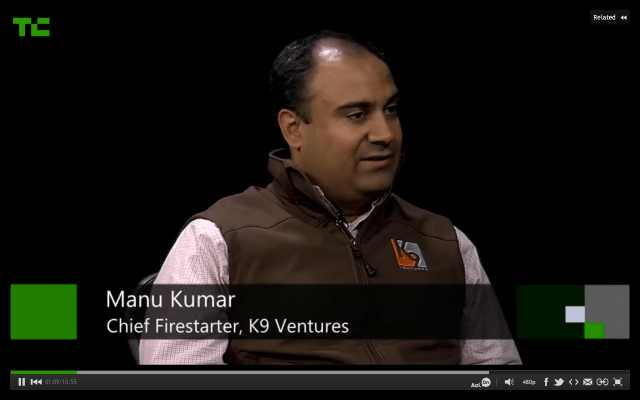Editor’s Note: Semil Shah (@semil) is currently an EIR with Javelin Venture Partners and has been an official contributor to TechCrunch since January 2011.
“In the Studio” continues this week by welcoming a technologist, entrepreneur, and investor who has, over the years, leveraged his work in core imaging and computer vision to discover, help create, and eventually commercialize a range of technologies, many of which have focused around the camera, especially on mobile phones.
Manu Kumar, the self-proclaimed “Chief Firestarter” of his seed-stage fund, K9 Ventures, has been on a roll (and just announced a new, bigger fund). While most of the world is still processing the meteoric rise of products like Instagram and Pinterest, Kumar has been thinking about computer vision for a long time, dating back to his PhD work on eye-tracking. It was as a student, in fact, that he met the founder of Lytro, invested in the company, and spent a considerable amount of time helping the company form. It was through these experiences that Kumar learned more about advancements in camera hardware and what those advancements meant for application development.
Since then, Kumar has had his hands in a number of startups that leverage a camera in some way, such as HighlightCam, Card.io (acquired by PayPal), CardMunch (acquired by LinkedIn), Occipital (which built and sold RedLaser to eBay, among other products), and soon-to-be-launched 3Gear Systems — all in addition to Refocus Imaging, which became Lytro. In this video, we focus our discussion on imaging in general and camera phones, where Kumar traces the hardware advancements to the camera in iPhones, for instance, and what types of new applications these advancements would allow, as well as what hardware improvements he hopes to see in the near future. Kumar also shares some deep advice for developers who are interested in the space, warning them that in order to unlock truly new things with the camera, it requires deep technical expertise in aspects of computer vision and more time than a weekend hack project. For anyone seriously interested in imaging and cameras, this discussion is a must-watch.
